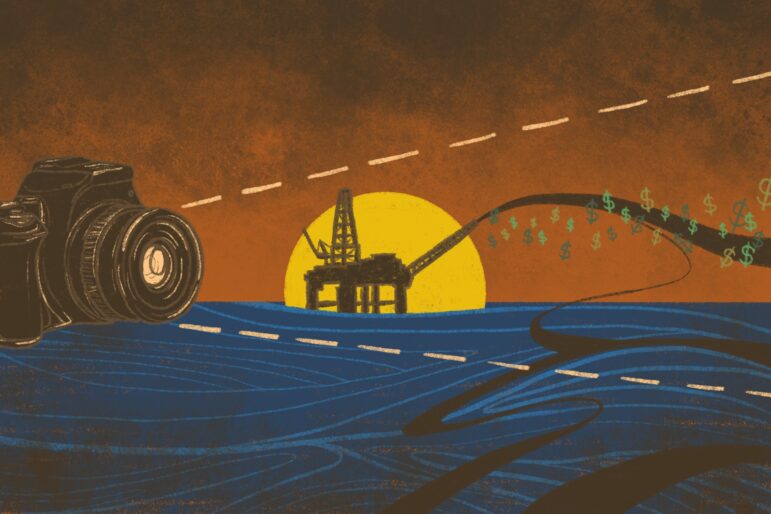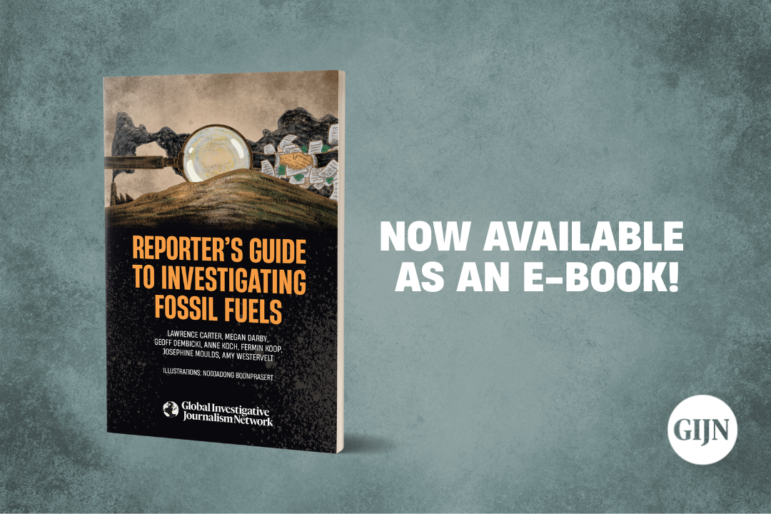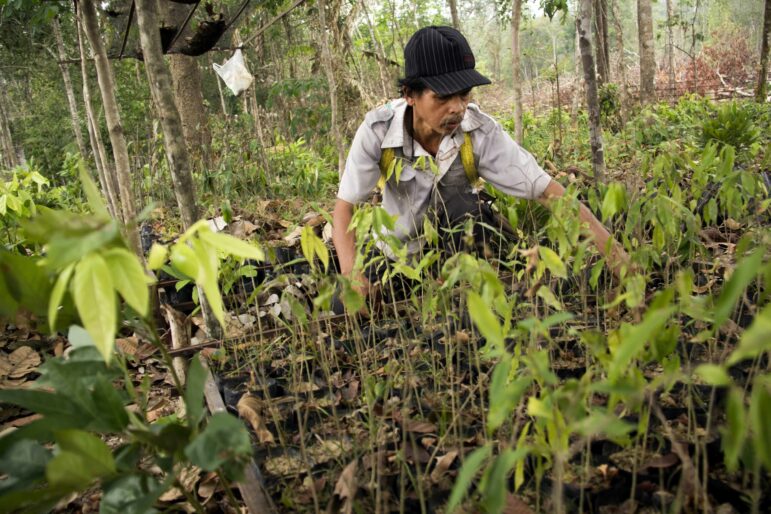

Illustration: Nodjadong Boonprasert for GIJN
Guide to Investigating Fossil Fuels: Broader Industry Ecosystem
Guide Resource
Guide to Investigating Fossil Fuels
Chapter Guide Resource
Guide to Investigating Fossil Fuels: Introduction
Chapter Guide Resource
Guide to Investigating Fossil Fuels: Private and State-Owned Companies
Chapter Guide Resource
Guide to Investigating Fossil Fuels: Broader Industry Ecosystem
Chapter Guide Resource
Guide to Investigating Fossil Fuels: Lobbying
Chapter Guide Resource
Guide to Investigating Fossil Fuels: Greenwashing
Chapter Guide Resource
Guide to Investigating Fossil Fuels: Government Regulations and Policies
Chapter Guide Resource
Guide to Investigating Fossil Fuels: The Industry’s Future
Chapter Guide Resource
E-Book: Reporter’s Guide to Investigating Fossil Fuels
At the COP27 climate talks in Sharm el-Sheikh, Egypt, UN Secretary General António Guterres delivered a typically blistering speech. “Using bogus net zero pledges to cover up messy fossil fuel expansion is reprehensible. It is rank deception,” he railed. “This toxic cover-up could push our world over the climate cliff. The sham must end.”
This was not just leveled at the coal, oil, and gas producers, however, but also their financial enablers — a sprawling network of global corporations that perpetuate the dominance of fossil fuels. Often these are household names — major banks and home insurers — which are enriching themselves while providing vital support to companies pushing the planet beyond its survivable limits.
Fossil Fuel Ecosystem
It is hard to overstate the extent to which the global economy is dependent on fossil fuels. This is an industry that infiltrates every part of our lives — from our cars, heating, and electricity, to the plastics in our clothing and petrochemicals in our shampoo. Propping the industry up, in addition to the banks and insurance companies, is a huge substructure of consultancies, engineers, services companies and auditors, consultants, lawyers, and advertising and public relations firms.
Enablers
There would be no coal mining or oil and gas extraction without insurance, necessary to cover the many risks involved. Ironically, insurers have been ahead of the game in assessing the risks posed by climate change and, as reported by Christopher Flavelle at The New York Times, have been pulling coverage from homeowners across the United States.
Funding is also crucial. Fossil fuel companies have borrowed almost $7 trillion to finance their activities between 2016, when the world committed to limit global warming, and 2023. More than half of the money raised last year was in the form of loans, often arranged by multiple banks.
Debt can also be in the form of bonds, a kind of IOU where the issuer promises to pay back the face value on a certain date, as well as regular interest. Companies issue bonds, which are sold to investors, such as asset managers or pension funds. Banks help arrange those bonds, meaning they play a crucial role but do not lend the money directly. Increased scrutiny and regulation have pushed some banks to reduce their funding of the fossil fuel industry, driving companies to raise money from hedge funds, private equity, and other private credit providers.
Credit rating agencies assess the risk that companies will not make the interest payments on these bonds and, in recent years, have branched out to assess the green credentials of certain companies. Slammed for downplaying risks that led to the financial crisis of 2008, these agencies are often criticized for the vague methodologies behind their environmental, social, and governance (ESG) ratings of companies. Bloomberg ran an excellent exposé of one of the biggest ESG ratings providers, MSCI, highlighting ratings upgrades for major companies whose policies have failed to address environmental problems such as steadily increasing greenhouse gas emissions. MSCI defends its methodology as the most financially relevant for the companies it rates.
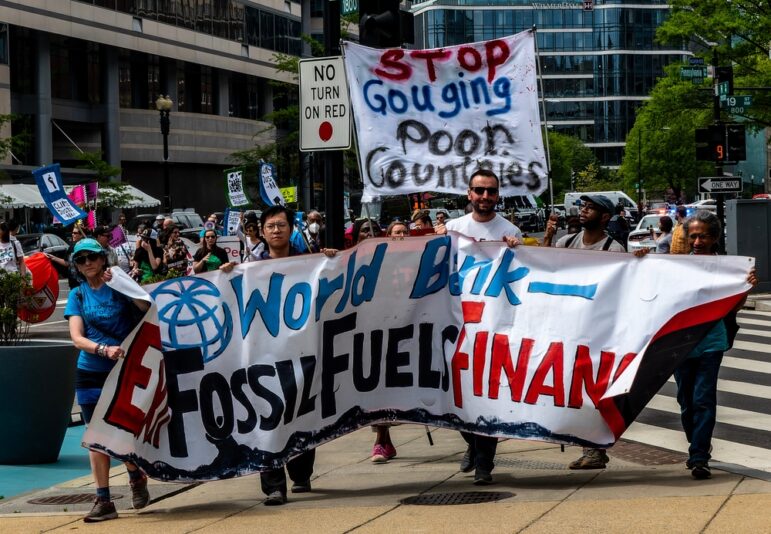
A 2023 protest in Washington, DC calling for the World Bank to end its fossil fuel financing. Image: Shutterstock
It is not just private finance that fuels this industry. The World Bank, the International Monetary Fund, and other international financial institutions (IFIs) are funded by taxpayer money. As well as financing fossil fuel projects, IFIs influence policy in countries and provide technical assistance which has tended to favor fossil fuel interests.
Advertising, marketing, and public relations firms are paid to burnish the image of fossil fuel companies in the eyes of an increasingly skeptical public. Matthew Green, global investigations editor at DeSmog, a global news site founded in Canada that has been reporting on this industry for almost two decades, said: “They create this kind of mood music that suggests to the public and policymakers that these giant [oil and gas] companies have the climate crisis in hand; that we can trust that smart people are working on techno fixes that will somehow deliver us to a place of climate safety.”
But this work can tarnish their brands. Ad firms in particular face an acute challenge when associated with fossil fuel clients, which may put off other prospective clients and make it harder to attract the best talent.
Lawyers and lobbyists, auditors, and consultants face the same difficulties. Some of their work might involve enabling fossil fuel clients to evade climate regulation and exploit loopholes that worsen the climate crisis, creating a major conflict with climate-focused clients.
Shipping and Processing
Coal, gas, and oil are all physical products that must be extracted, processed, and shipped. Companies that increasingly call themselves energy technology firms — such as Schlumberger, The Weir Group, and Baker Hughes — provide essential services to the industry but do not face the same level of scrutiny from journalists and campaigners as the fossil fuel majors.
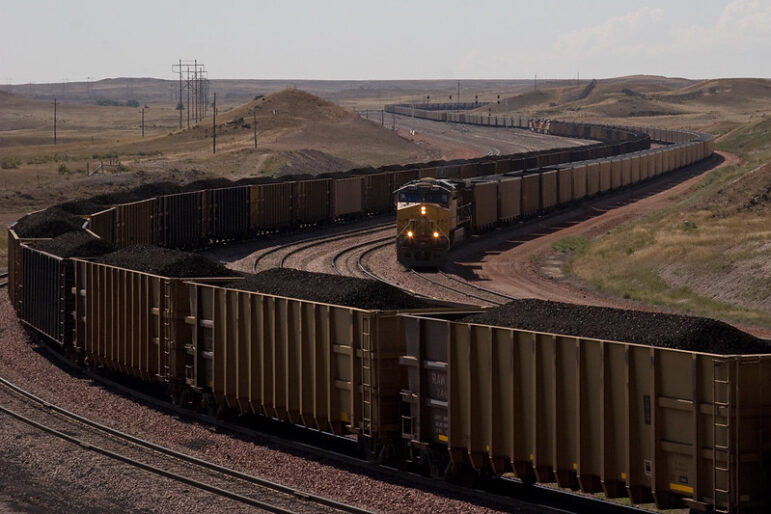
Coal trains in the US state of Wyoming. Image: by Kimon Berlin, Creative Commons
While coal is transported by rail, trucks, and ships, oil and gas mostly flow through networks of pipelines snaking across borders and under the sea — with a combined length that could circle the earth 30 times. The pipelines are built and operated by yet another subset of the industry, including companies such as Enbridge and TC Energy.
Much of this global trade is orchestrated by giant commodity groups, such as Trafigura, Gunvor, and Vitol, that buy, sell, ship and store fossil fuels.
Purchasers
The fossil fuel industry would not exist without demand for its products. Almost two thirds of electricity is still generated by burning fossil fuels. Oil remains the dominant fuel for transport – in cars, trucks, planes, and ships. As the world shifts to electric vehicles, the fossil fuel industry is ramping up demand for petrochemicals – which are made from oil and gas and can be found in everything from fertilizers to face creams – and the environmentally hazardous plastics industry.
The power, transport and chemical industries have proved resistant to a transition away from fossil fuels, lobbying against climate action and engaging in greenwashing. The links between the producers of fossil fuels and their buyers are sometimes overt – many petrochemical companies are owned by oil and gas companies – and sometimes not. But their power and influence as key pillars of the global economy mean they too are worthy of media scrutiny.
Who to Cover?
With this array of actors to choose from, what should guide journalists in selecting a topic? You may want to zero in on the largest corporations, the most hypocritical, a household name, or a company based in your hometown.
Whatever company or sector you pick, you’ll need to peel back the layers. One step back from the insurers, are the brokers arranging the insurance coverage, such as Marsh, Aon and Willis Towers Watson.
If you decide to focus on the world’s most polluting company, Saudi Aramco, you will find one of its key banking partners is HSBC, which trumpets its climate credentials and has been lauded as the world’s best bank for sustainable finance. JPMorgan Chase, meanwhile, was the biggest lender to the sector over the eight years to 2023.
Peeling back another layer will expose the investors that support the fossil fuel industry and reap the rewards in the form of generous dividends. In 2023, BlackRock was the world’s biggest investor, managing over $10 trillion worth of funds and assets – and had billions invested in fossil fuel companies, including those involved in extracting oil from the Amazon.
Scientists agree there should be no new fossil fuel infrastructure if the world has any hope of limiting global heating to 1.5 degrees Celsius. So you might like to focus on the most expansionary parts of the fossil-fuel industry – such as companies building new pipelines, or providing rigs for Arctic drilling, and deep-sea exploration, including Yinson and COSL Drilling.
Local stories can bring new audiences to this topic. Your investigation might focus on a local, fossil fuel-related business, work backwards from a nearby environmental disaster, or reveal how global practices are impacting local communities. Consumer-focused investigations can play a similar role. This might involve digging into investments made by retirement funds, for example, and highlighting the environmental destruction workers’ pension funds are unwittingly facilitating by propping up fossil fuel companies.
What to Report On?
Many of the businesses aiding the fossil fuel industry do not contribute directly to global warming. Their emissions are largely limited to heating and cooling their offices and flying executives to meetings.
But they have an enormous impact through the essential services they provide to fossil fuel company clients. Whether they are morally or legally culpable for the actions of their clients through their own enabling roles is increasingly under scrutiny.
Under pressure from investors, customers, and employees, many of these companies have made climate pledges. Over half of the world’s biggest publicly-listed corporations have now made net zero pledges, which come in many different formulations and vary in what they deliver. The simplest way to expose the “toxic cover-up” that UN Secretary General Guterres was railing against is to compare what companies do with what they say.
Business as Usual
Insurance companies fiercely guard the secrecy of their involvement in contentious projects — even internally — to avoid scrutiny from climate campaigners, investors and their own employees. But it is possible to dig out the details from public records and source work and contrast the company’s roles in environmentally disastrous projects with their climate promises. At the Bureau of Investigative Journalism (TBIJ) we exposed an insurance broker’s role in the East African Crude Oil Pipeline, which the company took on despite a petition from its own employees urging executives to turn down the work.
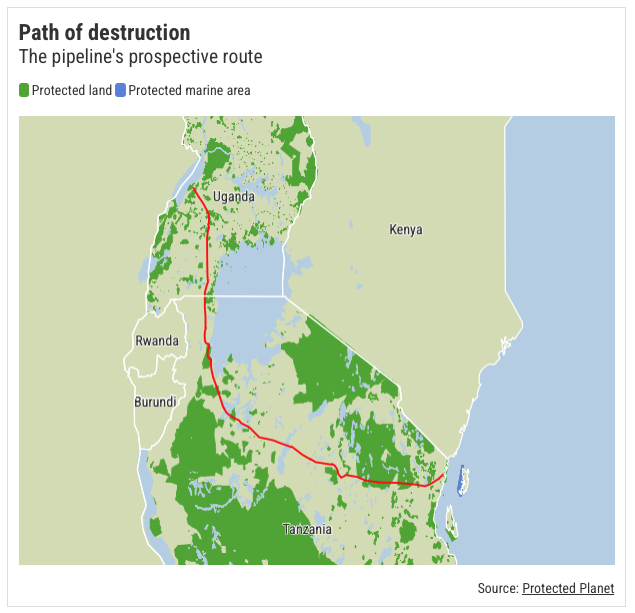
TBIJ showed the projected EACOP pipeline route through eastern Africa. Image: Screenshot, TBIJ
DeSmog has made a name for itself holding the advertising and public relations (PR) industry accountable for greenwashing and climate misinformation, exposing where lofty climate rhetoric clashes with their choice of clients. Matthew Green at DeSmog says the best stories in this field give an inside view of conflicts taking place within these organizations between staff and management. “Stories that tear away the curtain on the internal tensions over climate policy at these companies are the most valuable because they help to inform employee activism. If we’re talking about climate accountability, we want to know which are the chief executives and directors who are complicit in greenwashing the fossil fuel industry.”
As climate-related litigation heats up, law firms with net zero promises tread a delicate path. My colleague Ed Siddons has reported that one of the UK’s largest law firms — selected as the government’s legal provider for the United Nations’ COP26 — sought over £1 million (US$1.25 million) in legal fees from climate protestors. A spokesperson from the law firm DLA Piper said: “The firm supports the right to protest lawfully and recognises the need to build a sustainable future. But any change must be brought around in compliance with the law, for the protection of the country and protestors.”
Gaping Loopholes
Banks have been celebrated for introducing policies refusing some kinds of financing for fossil fuels. But, look a little closer, and you will find they continue to funnel billions to the fossil fuel industry. At TBIJ, we showed that in the year since HSBC bank promised to stop funding new oil and gas production, it helped raise $50 billion for companies developing new oil and gas fields. In this story, published with ITV News, investors criticized what appears to be a gaping loophole in HSBC’s policy, which excludes finance for specific projects but not the “general corporate finance” — money raised by banks that can be used for any business purpose, including oil and gas production. HSBC said its policy allows the bank to continue providing finance “at a corporate level” and its approach “is based on the latest science for achieving net zero.
Exposing a breach of a policy can be hard because the meaning of documents can be twisted to a company’s purpose, but as my colleagues Nimra Shahid and Rob Soutar showed in another investigation it is possible, even though the bank in question stated that “operates strict policies that govern our financing”.
Environmental Destruction
Another approach is to work backwards from an environmentally disastrous project, linking it to the companies that might otherwise escape notice.
Ed Davey at the Associated Press zeroed in on a company spilling oil in the Amazon, suppressing Indigenous opposition, and reportedly collaborating with a terrorist organization. Davey successfully linked it back to a number of banks with climate and human rights policies that should have known better. “You had more red flags than a Chinese Communist Party Conference,” he said. Unusually, he was unable to do on-the-ground reporting for that story, but instead drew information from a UN Special Rapporteur report and statements that Indigenous people had given in a court case, helping him to paint a vivid picture of the damage the company had caused. A spokesperson for the oil company implicated said it had cleaned up the spilled oil and would defend itself in the courts. Regarding liability for past acts, they said, they are “questions of law and fact on a case-by-case basis.”
Greenwashing and Lobbying
Just like the fossil fuel companies, their enablers spend millions on greenwashing, often helpfully signposted with keywords and phrases. Banks, insurers, and engineers all say they are “helping their clients transition.” Taking a closer look at a client’s actual record can expose this as an excuse for continuing with business as usual. Another issue to pursue might be digging into what a bank includes in its own definition of “sustainable finance.”
Reporting on how these companies covertly use their influence to lobby against climate action can skewer their supposed commitment to support it. That might be revealed in public statements on policy issues. Or it might be something kept behind closed doors, which requires deeper source work.
Techniques
Reporting on the enablers of fossil fuel companies doesn’t require any formal financial training, just a willingness to wade into complex topics and back up your reporting. Most stories will be about multinational corporations with impact that spans continents, making collaboration with journalists around the world hugely valuable.
Data and Documents
Many climate stories are hiding in plain sight. In addition to their annual reports, green bond documents, and progress reports on achieving climate goals, banks and other organizations have put out reams of documents on emissions, climate impact, and forecasts of potential climate scenarios.
These can often be found in what banks tend to call their Environment, Social and Governance (ESG) reporting centers on their websites. Many publish what they refer to as ESG datapacks that are worth digging into. Corporations also produce lengthy sustainability reports, where greenwashing stories lurk in footnotes explaining their interpretation of key climate metrics. Take care with companies’ definition of Scope 3 emissions, which are supposed to include all the emissions in their supply chain, but are often much less comprehensive.
Using this wealth of publicly available material and comparing it with documents gained via Freedom of Information (FOI) requests can highlight inconsistencies or outright contradictions in what a corporation is telling different parties. In 2022, some US states, siding with the fossil fuel industry, threatened to stop doing business with financial institutions with strong ESG policies, prompting banks to send private letters promising that they would continue funding fossil fuels. At TBIJ, we then sent FOI requests, together with the non-profit think tank InfluenceMap, to obtain the letters and subsequently write about them to highlight the gulf between what financial institutions were saying about their ESG policies in public and what they were telling State Treasurers behind closed doors.
A number of campaign groups and academics have developed excellent tools for collating and organizing much of this material.
- Rainforest Action Network and other NGOs produce the Banking on Climate Chaos report, which takes stock each year of the amount of financing the world’s biggest banks have funneled to fossil fuel production.
- Reclaim Finance produces the Oil and Gas, and Coal policy trackers with links to the relevant policies by insurers, asset managers, asset owners, and banks.
- DeSmog has compiled a database of advertising and PR firms working for fossil fuel clients.
- BankTrack produces reports on environmentally problematic projects and companies with details of their financiers.
- The Net Zero Tracker analyzes the climate pledges, or lack thereof, from the world’s 2,000 largest publicly listed companies.
- Sierra Club produces a tool to track the progress of the huge buildout of liquefied natural gas terminals in the US.
- The EJ Atlas and Carbon Bombs are valuable resources when working backwards from environmental crimes.
- The EPA’s Greenhouse Gas Equivalencies calculator and Our World in Data’s table of countries’ annual emissions provide comparisons to give a sense of the extent of emissions these companies facilitate.
- Urgewald produces the Global Oil and Gas Exit List and the Global Coal Exit List with vital information on fossil fuel production.
Sources and Whistleblowers
This is a highly rewarding beat because of the unusual number of people who want to give you information. Many employees care deeply about the environment and may be uncomfortable with a particular deal they have worked on, or more systemic approaches that the industry is using to greenwash. Former employees can have damning information they are keen to share, although that clearly needs to be handled with care if they are seeking revenge.
It is worth spending time on LinkedIn to keep track of people working in key roles in the industry and noting when they have moved on. Former employees may retain loyalty to an institution soon after they leave but that can fade, so time your approach carefully. Ask contacts about any recent moves, as many people are slow to update their LinkedIn profiles.
Industry gossip means rival companies that miss out on contracts with the fossil fuel majors may have information about the entity that has won it.
Those working for environmental watchdogs can get frustrated with their inability to take action against powerful corporations and prove a fruitful source of leaked information. There are also many climate-committed, credible experts invited to sit on high-level advisory groups. They are worth cultivating so they reach out to you the moment they lose patience with groups often co-opted by industry.
It is also worth compiling a list of the key figures who can provide reactions that will make a scoop a front-page story — such as high-profile politicians, celebrities, or senior figures at the UN and other multilateral institutions. Campaigners will always decry the fossil fuel enablers, but it is much more meaningful to speak to investors, such as managers of pension funds, which hold shares or debt in the enabling companies. Investors with religious affiliations can be particularly powerful because of the moral authority they are seen to bring to a story.
On the Ground Reporting
The enablers of fossil fuels might conduct their business out of air-conditioned offices, but the impact of their actions are felt all around the world. It takes field reporting to tell the whole story.
Often investigations will go in a completely different direction after a field trip. When I started investigating the auction of rights to drill for oil in protected parts of the Congo Basin rainforest, the story seemed clear from our offices in London. Even early-stage exploratory drilling would be disastrous for the forest and its precious peatlands. A reporting trip to Kinshasa and the rainforest made it clear that many Congolese people — even some environmentalists — did not oppose the auction because they saw it as necessary for development. So we reported on the backroom deals surrounding the auction to demonstrate that any funds raised would never reach the population. The Congolese minister we focused on said claims of backroom deals were based on partial information and could be politically motivated. The company that won the auction insisted it was “on merit.”

The aftereffects of an oil spill on a mangrove swamp in Africa’s Niger delta. Image: Jerry Chidi, Creative Commons via Climate Visuals
Companies tend to behave worse in the developing world than they do in Europe or the United States, and the evidence is often there for anyone who cares to investigate. Perenco, an Anglo-French oil and gas producer, came under the media glare when it spilled oil in a protected nature reserve in the UK in 2023, but the company had long been criticized by climate activists for land pollution and water contamination across Africa and Latin America. “[Companies] think that no one’s ever going to turn up and see what they’re up to. That’s particularly true with countries that are more dangerous or difficult to operate in or more expensive — so they’re more careless,” noted Ed Davey.
Disclosures from investigative reporting on fossil fuel enablers are vitally important but can, on their own, be complex and dry. It helps to bring them to life with human stories and a vivid sense of place. Taking the reader on a journey to places they can see, smell, and feel will keep them reading. Including small visual or other details about different characters can help readers keep track of names they are encountering for the first time. These details can be gathered from communities worst affected by the environmental harms you are highlighting, and from the banks and corporations involved, meaning in-person meetings are always better.
Dealing with Blowback
Reporting on environmental crimes is dangerous and sometimes deadly in the Global South, meaning collaboration with high-profile, international publications and rigorous security planning and practices can be life-saving.
Reporting on the enablers of fossil fuel companies poses a different challenge. Banks and other companies are highly sensitive about their climate credentials. At TBIJ, we have written about corporations engaged in fraud, espionage, and money laundering. Their most aggressive responses to our reporting, however, tend to be reserved for stories accusing them of greenwashing.
Often their first response will appear to be an outright denial, delivered in barely decipherable jargon. When clarified, this will turn out to be little more than obfuscation. Institutions have also tried to discourage us by saying “on background” that we were wrong but refusing to do so on the record. We have subsequently published with no legal repercussions so far.
Set the deadline for corporations to respond to “right to reply” queries some days before your planned publication date, allowing time to engage in the inevitable back and forth. And be prepared for an onslaught.
Case Studies
How Japan Ignored Climate Critics and Built a Global Natural Gas Empire — Bloomberg
European Investors are Pouring Trillions into Promises of Green Growth. Where Does that Money End Up? – Follow the Money
 Josephine Moulds is an award-winning investigative journalist at the Bureau of Investigative Journalism, where she covers financial institutions and climate change. She has been a financial journalist for over 15 years, working for the Guardian, the Telegraph, and the Times (of London).
Josephine Moulds is an award-winning investigative journalist at the Bureau of Investigative Journalism, where she covers financial institutions and climate change. She has been a financial journalist for over 15 years, working for the Guardian, the Telegraph, and the Times (of London).


